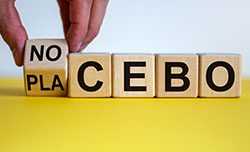PREVIOUS
The Nocebo Effect: What You Believe Can Hurt You!
By MICHAEL SHAPIRO, PhD
March 2023
It goes without saying (I hope) that the mind has a powerful but often mysterious influence on the body. In fact, there are several things that our bodies do that appear to serve no obvious function except to express what’s going on in the mind. Take laughter, for example: what’s up with that? From the standpoint of evolution, it seems to serve no purpose: laughing at something funny is an involuntary bodily reaction that doesn’t appear to help ensure survival of the species…unless, of course, you’re a comedian whose life depends on it! Same with blushing and crying. These are also physical reactions to mental activity that seem to serve no purpose besides the outward expression of emotions.
As mysterious as it sometimes seems, the powerful connection between mind and body can actually be exploited for the purpose of healthcare! For example, in a technique called biofeedback, high-tech electronics are used to help patients gain control over certain bodily reactions, such as heart rate and muscular tension. Sophisticated sensors convert these physical reactions into a signal, usually a sound or a flashing light, that increases or decreases in intensity, depending on the intensity of the patient’s bodily reaction. Then, with the help of techniques like progressive relaxation, a patient can use these visible and audible signals to learn how to gain control over how their body reacts to things like anxiety and chronic pain.
Perhaps the most famous medical application of the mind-body connection is the placebo effect. Simply stated, the placebo effect occurs when a medical treatment (that has no actual therapeutic value) proves beneficial to a patient, only because the patient believes that it will be. For example, after being told that he or she is being given a promising new treatment for some condition, the patient is given a sugar pill, saline injection, or some other “treatment” that actually has no beneficial (or harmful) properties. The patient’s belief in the effectiveness of this treatment yields improvement in the condition, ostensibly because of the tremendous power of the mind. How all this happens is poorly understood; but the placebo effect is so powerful and consistent that it has been exploited since the 18th century and has become an important component of evaluating the effectiveness of “real” medicines and medical treatments!
Less known (but equally important) is the placebo effect’s “evil twin,” the nocebo effect. This term (from Latin, meaning “I shall harm”) refers to a patient’s negative response to a treatment because he or she has been conditioned to expect it. For example, if told beforehand that a procedure is going to be especially painful or uncomfortable, the patient will experience more pain or discomfort than he or she would otherwise. Similarly, when told to expect a particular severe side-effect of a medication, a patient may actually experience that side-effect, even when the medication is nothing more than an inert substance. In one recent study, almost half of the 15 patients who were told that their drug might produce headaches actually developed headaches during a trial of the medication; while none (that’s right, not one) of the 13 patients in a separate group that was not given this “headache warning” developed headaches. Once again…the incredible influence of the human mind.
Recent research suggests that the nocebo effect (the experience of an unpleasant effect because you have been “primed” to expect one) may actually be more powerful than the placebo effect (experiencing a pleasant or beneficial effect because you expect it). This applies not only to medicines and medical procedures, but to communication between doctors and patients. As such, if a patient believes a medical provider to be harsh or un-sympathetic, it may actually have a negative impact on the patient’s prognosis. In contrast, the prognosis is better if the patient perceives the provider to be “good” and kind.
Now let’s be fair: doctors and other healthcare providers are not necessarily in the business of administering “good news.” After all, you usually see them only when you’re sick (which is bad news). In this context, they have an ethical obligation to explain the possible negative outcomes of all illnesses, medicines, and medical procedures. As patients, we need to hear this information, to make informed healthcare decisions that are in our own best interests. However, from the provider standpoint, the way that the bad news is delivered can contribute to either placebo or nocebo experiences. So, if you have a provider who does not make you feel “listened to” and cared-for, or who focuses only on the bad news (to the exclusion of being hopeful and supportive), it may be time to find another provider. According to the nocebo effect, the way your provider communicates with you may have a negative impact on your prognosis.
From the patient standpoint, we’ve learned that our expectations have much to do with how we respond to treatment. Therefore, if we look at healthcare providers as mystical, all-knowing healers who have all the answers and can cure everything, we are bound to be disappointed (MD does not stand for “Medal of Divinity,” as was once thought). Your provider won’t treat you with rainbows and unicorns because that wouldn’t be helpful—at least not for most of us. Instead, the provider-patient relationship should be a collaborative one that balances our own internal sense of optimism and hopefulness with evidence-based treatment that is compassionately (but realistically) administered by a competent and knowledgeable—but simply human—professional.
So…that powerful and inescapable mind-body connection. Often puzzling, but always human and always useful when handled correctly. When it comes to medical decisions, let’s remember that our attitudes, and those of our healthcare providers, influence our prognosis. Oh, and laugh more…I’m not really sure why, but it might be good for you. you.

